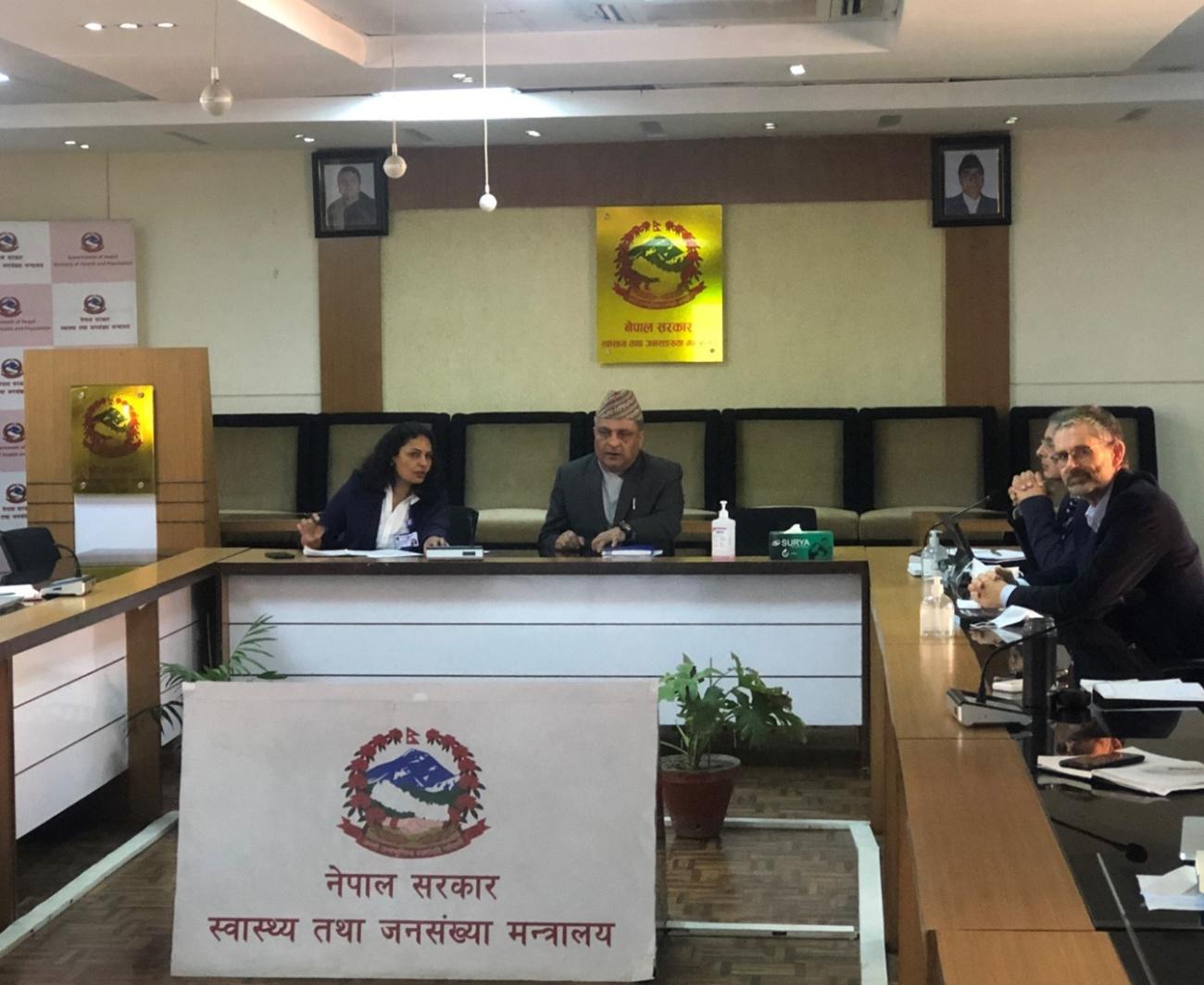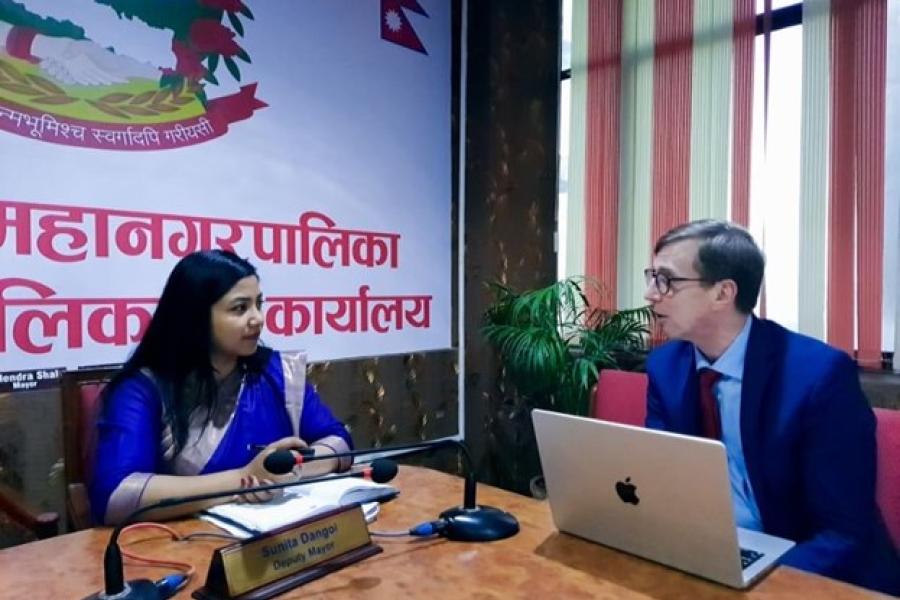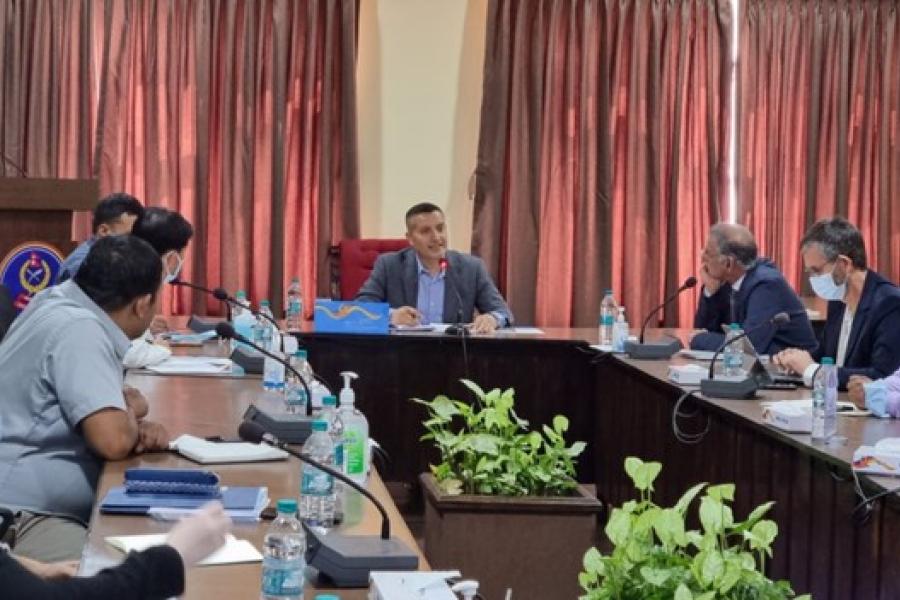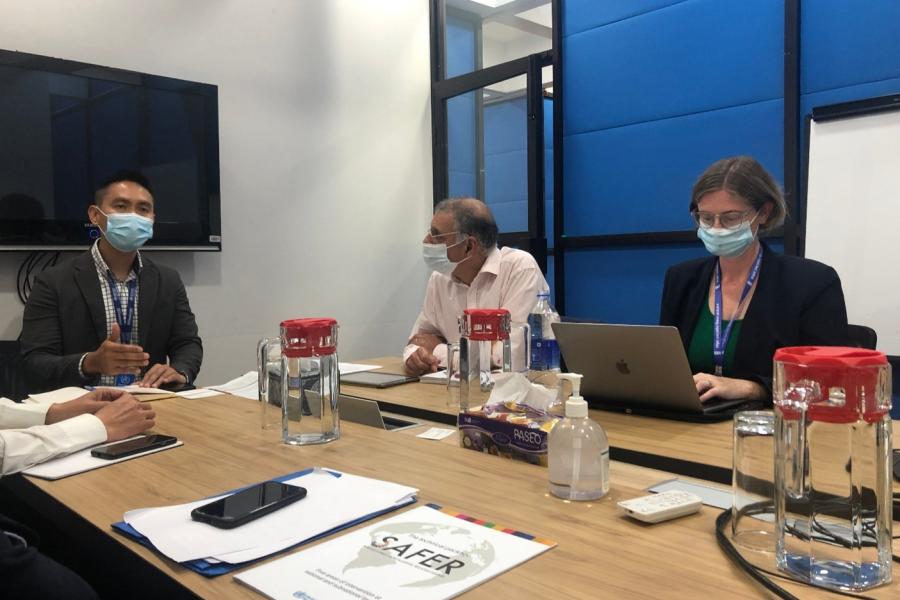SAFER Plan Announced To Address Alcohol Problems In Nepal

MoHP, WHO, and global and civil society partner organizations announced today an ambitious roadmap for reducing alcohol-related harms in Nepal.
Globally, alcohol causes 3 million deaths per year, according to WHO. In Nepal, from 2013 to 2018 the percent of the population drinking alcohol in the past month grew by 20%. Of those who drink, more than a third drink heavily. And one in six current or former drinkers drove under the influence of alcohol in the last 30 days.
“Safeguarding Nepal’s health and safety during a period of rapid development requires that we face and prevent alcohol-related harms,” said Dr Dipendra Raman Singh, Director General, Department of Health Services. “Achieving this will require clear and effective policies, assertive leadership, and strong multi-sectoral partnerships.”
The roadmap charts the way forward for the government of Nepal to implement the SAFER package of high impact and proven interventions to prevent and reduce alcohol-related harm in Nepal. These interventions include reducing alcohol availability, preventing drink-driving, increasing access to alcohol treatment and screening, banning alcohol advertising and sponsorship, and setting alcohol taxes high enough to reduce harm.
Key steps forward for Nepal include implementing and enforcing Nepal’s ban on alcohol advertising, effective limitation of alcohol selling hours, spreading successful drink-driving prevention practices throughout the country, and raising the profile of the public health benefits of alcohol taxation in existing annual reviews of how much alcohol should be taxed.
A joint national and international expert advisory group, invited by the Ministry of Health and Population, solicited information and input from multiple ministries and stakeholders, including civil society, to develop a roadmap tailored for Nepal’s specific cultural and religious setting. Nepal is one of two countries selected to lead the implementation of the SAFER initiative. The roadmap lays out objectives and actions for the next two years, during which WHO and internal and external partners will support progress towards SAFER implementation.

“WHO and its UN partners commit to mobilizing and collaborating with the government of Nepal to implement this exciting initiative,” said Dr. Rajesh Sambhajirao Pandav, the World Health Organization’s Representative to Nepal.
For the SAFER initiative, the government of Nepal has partnered with WHO, the UN Development Programme, and the UN Interagency Task Force on Non-Communicable Diseases (NCDs), as well as four global civil society organizations: Movendi International, the NCD Alliance, the Global Alcohol Policy Alliance, and Vital Strategies.
“This package is a powerful catalyst for ensuring health and development for all” said Sumnima Tuladhar, executive director of Child Workers in Nepal Concerned Center (CWIN-Nepal). “Civil society is a crucial engine driving multi-sectoral partnerships to unlock the benefits of the SAFER alcohol policy package, for health, women and children’s rights, poverty eradication, and economic prosperity.”
The specific components of the SAFER package are:
- Strengthen restrictions on alcohol availability;
- Advance and enforce drink-driving countermeasures;
- Facilitate access for screening, brief intervention, and treatment;
- Enforce bans or comprehensive restrictions on alcohol advertising, sponsorship, and promotion;
- Raise prices on alcohol through excise taxes and pricing policies.
Media contact:
Tsering Dolkar Gurung, gurungt@who.int
##
तत्काल प्रकाशनका लागि
कात्तिक ४ गते २०७९
नेपालमा मदिरा सम्बन्धि समस्याको सम्बोधन गर्न सेफर (SAFER) योजनाको घोषणा
आज स्वास्थ्य तथा जनसङ्ख्या मन्त्रालय, विश्व स्वास्थ्य सङ्गठन र अन्तराष्ट्रिय तथा नागरिक समाजका साझेदार संस्थाहरूले नेपालमा मदिराजन्य क्षति न्यूनीकरणका लागि महत्वाकांक्षी मार्गचित्र घोषणा गरेका छन् ।
विश्व स्वास्थ्य संगठनका अनुसार विश्वमा प्रतिवर्ष मदिराले ३० लाख मानिसको ज्यान लिन्छ। नेपालमा सन् २०१३ को तुलनामा २०१८ मा मदिरा सेवन गर्नेहरुको सङ्ख्यामा २० प्रतिशतले वृद्धि भएको छ । उनीहरु मध्ये, एक तिहाइले अत्याधिक मदिरा सेवन गर्छन्। हाल मदिरा सेवन गरिरहेका तथा छाडिसकेका प्रत्येक ६ मध्ये १ जनाले पछिल्लो ३० दिनमा मदिरा सेवन गरी सवारी साधन चलाएको पाइएको छ ।
"नेपालको द्रुत विकासको समयमा स्वास्थ्य तथा सुरक्षाको रक्षार्थ मदिराले गर्ने क्षतिको सामना गर्न र यसलाई रोक्न आवश्यक छ," स्वास्थ्य तथा जनसङ्ख्या मन्त्रालय, स्वास्थ्य सेवा बिभाग क महानिर्देसक डा दीपेन्द्र रमण सिंहले भन्नुभयो "यसका लागि स्पष्ट र प्रभावकारी नीतिहरू, दृढ नेतृत्व र सुदृढ बहु-क्षेत्रीय साझेदारी आवश्यक पर्दछ।"
यस मार्गचित्रले नेपालमा मदिराले गर्ने क्षति रोक्न र कम गर्न प्रभावकारी र प्रमाणित पहलहरु सहितको सेफर प्याकेज (SAFER package) कार्यान्वयन गर्न नेपाल सरकारलाई दिशानिर्देश गर्दछ ।
क्षति कम गर्ने पहलहरुमा मदिराको उपलब्धता घटाउने, मदिरा सेवन गरी सवारी साधन चलाउने कार्य रोक्ने, मदिरा सम्बन्धि उपचार र जाँचमा पहुँच बढाउने, मदिराजन्य वस्तुको विज्ञापन र प्रायोजनमा प्रतिबन्ध लगाउने, र अधिकतम कर लगाउने विषयहरु समावेश छन्।

नेपालका लागि प्रमुख कदमहरूमा मदिराको विज्ञापनमा कडाईका साथ प्रतिबन्ध लागू गर्ने, मदिरा किनबेचको समय तोकी प्रभावकारी रूपमा नियमन गर्ने, मदिरा सेवन गरी सवारी साधन चलाउन नदिनका लागि देशैभर प्रभावकारी रोकथामका अभ्यासहरू कार्यान्वयन गर्ने, र हाल मदिरामा कति कर लगाउँदा जनस्वास्थ्यका लागि लामदायक हुन्छ भन्ने विषय वार्षिक समीक्षाहरूमा छलफल गर्ने जस्ता कुराहरु पर्दछन् ।
स्वास्थ्य तथा जनसङ्ख्या मन्त्रालयले आमन्त्रित गरेको राष्ट्रिय तथा अन्तर्राष्ट्रिय विज्ञ सल्लाहकारहरुको संयुक्त समूहले नेपालको विशिष्ट सांस्कृतिक र धार्मिक परिवेशका लागि उपयुक्त मार्गचित्र विकास गर्न नागरिक समाजलगायत विभिन्न मन्त्रालय र सरोकारवालाहरूसँग परामर्श लिएको थियो ।
नेपाल, सेफर पहल कार्यान्वयनको नेतृत्व गर्न छानिएका दुई देशमध्ये एक हो। मार्गचित्रले आगामी दुई वर्षका लागि उद्देश्य तथा कार्यक्रमहरुको निर्माण गर्दछ, जुन अवधिमा विश्व स्वास्थ्य संगठन र आन्तरिक तथा बाह्य साझेदारहरूले सेफर कार्यक्रमको सफल कार्यान्वयनका लागि सहयोग गर्नेछन्।
"विश्व स्वास्थ्य संगठन र यसका संयुक्त राष्ट्र संघिय साझेदारहरू यो उत्साहजनक पहल कार्यान्वयनमा नेपाल सरकारसँग सहकार्य गर्न प्रतिबद्ध छन्," विश्व स्वास्थ्य संगठन नेपालस्थित कार्यालयका प्रतिनिधि डा राजेश संभाजीराव पाण्डवले भन्नुभयो।

बागमती प्रदेशमा सेफर नेपाल मिसन टोली र विश्व स्वास्थ्य संगठनबीच बैठक । फोटो क्रेडिट : सेफर
सेफर कार्यक्रमका लागि नेपाल सरकारले विश्व स्वास्थ्य संगठन, संयुक्त राष्ट्र संघिय विकास कार्यक्रम, र नसर्ने रोगहरूको लागि संयुक्त राष्ट्र संघिय अन्तर निकायिक कार्यदल, साथै चार विश्वव्यापी नागरिक समाज संगठनहरू: मोभेन्डी इन्टरनेशनल, एनसीडी एलायन्स, ग्लोबल अल्कोहल पोलिसी एलायन्स र भाइटल स्ट्राटेजीजसँग साझेदारी गरेको छ।
“सबैका लागि स्वास्थ्य र विकास सुनिश्चित गर्न यो कार्यक्रम एक उत्प्रेरक हो”, सिविन नेपालकी कार्यकारी निर्देशक सुम्निमा तुलाधरले भन्नुभयो, “स्वास्थ्य, महिला तथा बालबालिकाको अधिकार, गरिबी उन्मूलन, र आर्थिक समृद्धिका लागि सेफर नीतिका फाइदाहरू उजागर गर्न बहु-क्षेत्रीय साझेदारीमा नागरिक समाजको मुख्य भूमीका हुन्छ ।”
SAFER कार्यक्रममा विशेषगरी निम्न बुँदाहरु समावेश गरिएका छन्:
- मदिरा उपलब्धतामा प्रतिबन्धहरू बलियो बनाउने;
- मदिरा सेवन गरी सवारी साधन चलाउने गतिविधि बिरुद्ध उचित पहलहरु लागू गर्ने;
- जाँच, उपचार र आवश्यक पहलमा पहुँचका लागि सहजीकरण गर्ने;
- मदिराजन्य वस्तुको विज्ञापन, प्रायोजनमा व्यापक प्रतिबन्धहरू लागू गर्ने;
- अन्तःशुल्क र मूल्य निर्धारण नीतिहरू मार्फत मदिराजन्य वस्तुको मूल्य बढाउने ।
संचार सम्पर्क
छिरिङ डोल्कर गुरुङ, gurungt@who.int


